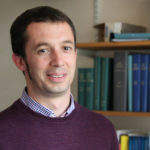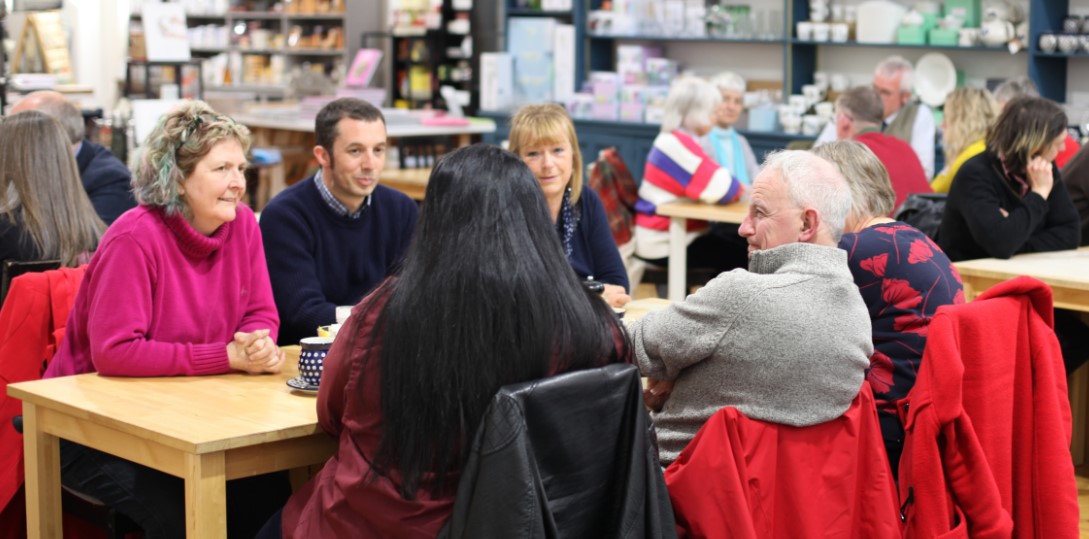
Having returned this week to Spain after a year spent working with the Glasgow End of Life Studies Group at the University of Glasgow, it is time to reflect on the experience. I’d like to weigh up the balance of my experiences there, and to try to explain what has changed for me and why.
As an epidemiologist and researcher, I work on a project of the ATLANTES programme about ‘the message of palliative care’, which aims to explore social perceptions about social and healthcare services, and the values which are broadcast relating to these fields.
ATLANTES is based at the Institute for Culture and Society (ICS) at the University of Navarra in Pamplona, Spain. The Glasgow End of Life Studies Group is based at the School of Interdisciplinary Studies on the University of Glasgow’s campus in Dumfries, Scotland.
If you are following the ATLANTES or the Glasgow End of Life Studies Group social networks you will be aware of the special collaborative relationship that exists between these two research groups.
Our teams got together in Pamplona in the late summer of 2015 for a symposium on the life and works of Dame Cicely Saunders, and during this very enjoyable period together we started to joke about trying to find a name for our collaborative work: ¿Pam-Fries? ¿Dum-Plona? ¿Glas-Lantes?
The joke continues and your suggestions are welcome!
So, having returned from my year’s sojourn in Scotland, I’ve thought about my experiences and the balance is without a doubt very positive indeed.
Here are a few reasons this international exchange was worthwhile:
Multidisciplinarity
I always have believed in the value of the multidisciplinary research, and the ICS and ATLANTES have opted for it. The Glasgow End of Life Studies Group is based within the School of Interdisciplinary Studies at the University of Glasgow so it is not difficult to imagine how rewarding it has been to work in that team, with its professionals from different disciplines (sociology, public health, philosophy, anthropology, communications, and more) and backgrounds (research, teaching and clinical).
Multidisciplinary approaches are essential in end of life care, going further than simply biological and physical dimensions, but also integrating the psychological, social and spiritual. Multi-disciplinarity also helps when thinking of community-based health and not just the individual-based approach.
Internationalisation
This year has allowed to ‘internationalise’ my work. Not only in terms of my CV, but also because I have had the opportunity to make contact with end of life care professionals from different parts of the world.
The work in which I have been involved has included interviewing more than twenty key informants from several public and private institutions from Asia, Africa, America and Europe. Gathering information and exploring opinions from different perspectives and from different contexts is really enrichment and stimulating.
Speaking of internationalisation, if you would like to read this blog in Spanish, please visit the ATLANTES blog.
Learning opportunities
My tasks in Scotland allowed me to get to know the ins and outs of the World Health Assembly (WHA) and of the World Health Organization (WHO). Moreover, I have learned in some detail about the works undertaken by several key actors whose aim is to include palliative care in the agenda of international and national political institutions. I have also learned in depth about Scottish specialist palliative care services and levels of its provision.
Broadening horizons
Currently, the major research project of the Glasgow End of Life Studies Group is related to end of life interventions, examining how they are transferred and/or translated to other cultures or contexts.
Although my work has focused on palliative care, I have learnt about other interventions for the end of life care which have a community-based approach. For example, those related to refugees running away from armed conflicts, or those developed in contexts with limited social and health care resources. I even took part in several death cafes and an evening dedicated to recently departed cultural icons.
Remote working
Although physically I have been working in Dumfries, my work with ATLANTES and my teaching at the ICS did not stop during this period. Luckily, new technologies and means of communication helped to shorten the distance. I have returned to Spain a master at Skype, WebEx and at transfers between planes, trains, coaches, and buses.
Scotland and its language
Yes, in spite of the tricky Scottish accent and the particular vocabulary of the population of Dumfries, I think that I have improved my English! And now, back in Spain, I miss that familiar accent, the people and even the Scottish weather.
Reinforced views
The experience, primarily, has served to reinforce my belief in the need to care for people at the end of their lives. Not only through health services, but also with a community-based approach involving all the population.
Coverage and development of palliative care and other end of life care services are still very limited in the majority of the world. Although almost all the countries recognize the need for strengthening palliative care as a component of comprehensive care throughout the life course (as seen in the WHA67.19 resolution of the World Health Assembly), much work remains to be done for its implementation.
In conclusion, after a year spent between Pamplona and Dumfries, between ATLANTES and the Glasgow End of Life Studies Group, I wish to take this chance to thank both research groups, their leaders and all the people working in them. It is they who helped realise all the positive points listed above, and they are the reason why I took up this opportunity.
Thanks for making the balance of professional and personal life very positive.
José Miguel Carrasco
Researcher, Programa ATLANTES, University of Navarra
Affiliate Researcher, Glasgow End of Life Studies Group, University of Glasgow


